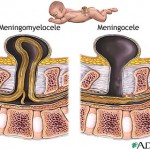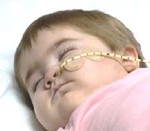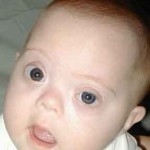Common Genetic Birth Disorders
Most children are born healthy but some have birth disorders. It’s better to be aware of the symptoms so that they can be corrected at the earliest.
 Spina Bifida
Spina Bifida
The back bone protects the spinal cord. Some times it doesn’t close completely during the prenatal development and leaves a gap. If the gap is small then it’s not a serious issue but if it’s large then could cause paralysis and other serious problems.
Some times the spinal cord itself would be protruding. Although exact cause is yet to be figured out, heredity and nutrition like inadequate folic acid in the mother’s diet are cited as the possible reasons. To reduce the chances of this disease, pregnant women and those planning for a baby are recommended to intake folic acid supplements. All women would be tested for spina bifida during pregnancy by ultra sound. If they are found positive, then a surgery would be performed on the baby in the utero to rectify the problem.
 Tay Sachs Disease
Tay Sachs Disease
This is a disease caused by deficiency in enzyme. This is a very rare disease and seen more commonly in Jews from Central and Eastern Europe. It’s genetic, i.e. only if the both the parents of the child have the gene for the disease then the child could possess it.
So those people with ethnic background as specified should get tested for the gene before going in for the child. Also, it can be detected in the utero via amniocentesis. Unfortunately, it can be detected in child at birth but only several months later. By this time the fatty deposits clog cells and prevent the baby’s nervous system from working. This would make the child to regress developmentally and result in death.
 Down Syndrome
Down Syndrome
A child is said to have Down Syndrome when he/she possess certain set of symptoms to indicate some degree of mental retardation. Those children affected by down syndrome have a distinct set of facial features, a large tongue and a short neck.
The degree of mental retardation varies from one Down Syndrome child to another. While some children may be highly functional others may require constant care. Studies say it occurs in one every 1300 babies born in US. It’s caused by an extra chromosome coming from the mother or father. The chances are high if one of the siblings of the baby has birth disorder and the mother is over 35 years of age. It can be detected via amniocentesis and it’s a recommended test for all pregnant women over 35 years of age.